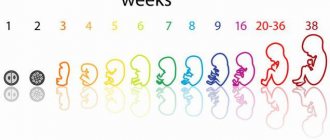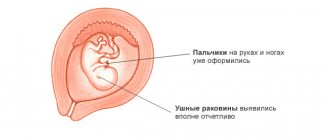Twenty-fifth week of pregnancy
Impending motherhood worries the expectant mother, but most often it appears in rosy colors.
Sometimes mood swings are observed, but this is quite normal, since the psyche may not yet adapt to its new position and may not know how to evaluate itself - as one organism or two. Over time, all fears will disappear, so you shouldn’t pay much attention to them. At the 25th week of pregnancy, the baby’s length is already approximately 30 cm, and the weight is approaching 700 g. Compared to what it was just a few weeks ago, the progress seems impressive, but this is not the limit. The fetal skeleton becomes stronger and longer, and muscle mass gradually increases. It is at this time that an important change is observed: in the child’s lungs the number of cells that are responsible for the production of surfactant increases significantly, which will subsequently give the child the opportunity to breathe independently. The development of the bone marrow is no less active, which by the 25th week of pregnancy is already ready to begin its work on the production of blood cells.
Twenty-fifth week of pregnancy
Future mom
Of course, mom is not far behind. Your belly is growing, you are getting heavier and experiencing some discomfort: heartburn, shortness of breath. The uterus has already risen 25 cm above the womb, it has become the size of a soccer ball and is squeezing other organs. This can also cause constipation, so watch your diet. Drink kefir, eat prunes and beets, move. You are rapidly increasing in volume, not only in the abdominal area, but also in the chest. It may release colostrum from time to time - just don’t squeeze it out! Maintain hygiene, wear only maternity underwear made from natural fabrics without unnecessary seams or scratchy decorative elements, change your panties and bra to larger ones on time. Be attentive to yourself and the baby, watch his movements and your own well-being. If you haven't heard from your baby for more than a day, there is cause for alarm. If abdominal or lower back pain is accompanied by other symptoms, consult your doctor for advice.
Well-being of a pregnant woman at 25 weeks
For the expectant mother, at 25 weeks of pregnancy it is also an alarming time. The fundus of the uterus has already risen by 25 cm, and it is the measurement of this indicator that provides very important information about the development of the fetus. If the size of the uterus is normal, then the child’s development is absolutely normal, but if not, then this may be a sign of developmental delay. There can be many reasons for this condition, but most often it is placental insufficiency. Its prerequisites are prolonged toxicosis, the threat of miscarriage, and any viral infection, especially one with complications.
But this is far from the only complication that can await an expectant mother at 25 weeks of pregnancy. In some cases, the reverse process occurs when the size of the uterus exceeds the required size. Sometimes this indicates that there is not one fetus, but several, which happens in approximately 8% of cases. In addition, this can be caused by a large amount of amniotic fluid, which is associated with the presence of infection in the body. Sometimes this happens in cases where a woman has previously had abortions or miscarriages. A doctor will be able to determine polyhydramnios during a routine examination using an ultrasound, but an experienced specialist will be able to do this even during a routine examination, since the uterus will be tense and seem like a ball filled with fluid.
Medical examination
From this week of pregnancy you will visit the doctor more often. The examination remains the same as during the entire pregnancy: weight, blood pressure, growth of the tummy and hip joint are monitored. General blood and urine tests are taken at every doctor's visit. During this period, hemoglobin and protein in the urine are monitored. That is, the facts that you do not have oxygen starvation and your kidneys can withstand the load.
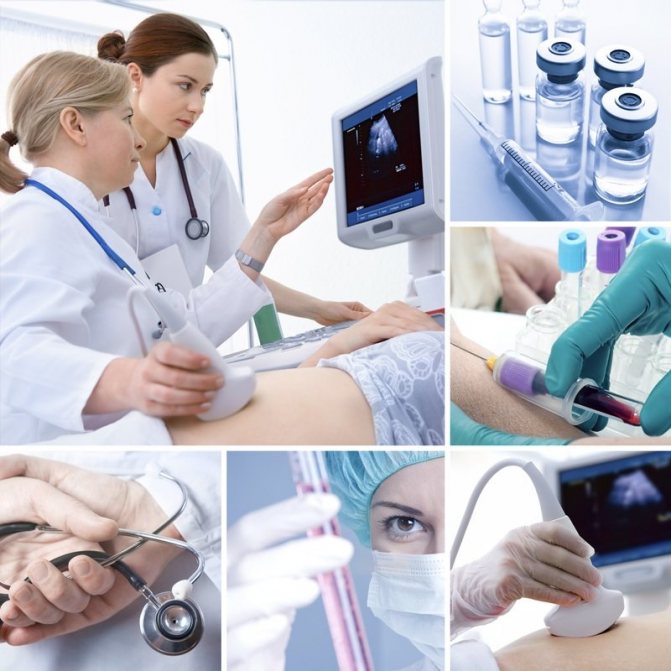
Examination of a pregnant woman
If there is any discharge from the genitals and itching, the doctor will take a swab from the vagina for analysis and, if necessary, prescribe treatment.
If there is pathology or complications, then treatment is prescribed in an individual approach.
Premature birth
In the seventh month of pregnancy, there are cases of premature birth. More often this occurs due to a pathology associated with the fact that the expectant mother previously had an abortion or a low location of the uterus.
More often, the symptoms of premature birth are accompanied by pain, blood or water discharge, and the expectant mother manages to call an ambulance and see a doctor in time and go to bed to maintain the pregnancy. There are cases when the water suddenly breaks, but in such cases the pathology is visible until the seventh month of pregnancy and the doctor recommends in advance to go to bed for prevention.
Doctors try their best to preserve the pregnancy, since the best development of the fetus occurs in the womb, and not in the incubator. But, if the baby decides that he needs to be born earlier, do not worry too much, during this period his organs are already formed, the main one being the respiratory system. A newborn has many chances to survive and grow up as a full-fledged person without any deviations.
Belly size
Some mothers have a miniature belly, while others seem oversized. If the child’s development is adequate for the duration of pregnancy, then the volume of the tummy should not bother you.
The growing uterus with the weight of the fetus puts pressure on neighboring organs: due to gastric contents entering the esophagus, heartburn occurs, the gastrointestinal tract cannot cope, constipation and bloating occur. To help a pregnant woman - fiber, as a kind of scrub for the digestive system, and laxative products: beets, prunes, yogurt. The bladder also suffers under the weight of the abdomen. Don't be patient and go to the restroom whenever you feel like it, no matter how often it happens. Constant runs to the toilet will soon end, and you will remember them with humor.
Due to the fact that the skin is stretched, the abdomen becomes covered with stretch marks. You won’t be able to avoid them, so accept them and try to at least reduce their intensity. Use pharmacy creams or gels against stretch marks. Do not massage your stomach intensely or use a dry brush!
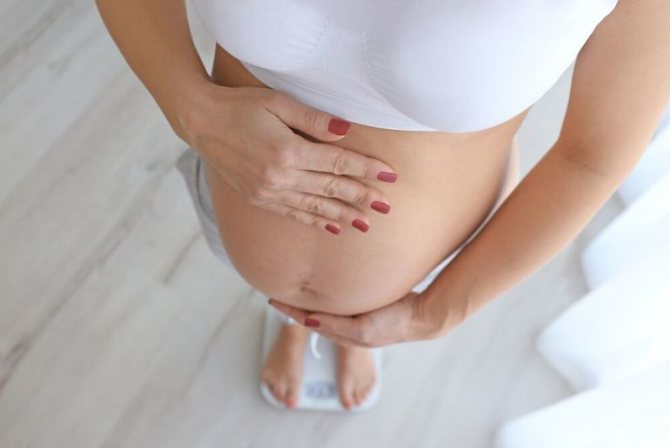
Belly size
Why is high temperature dangerous during pregnancy?
- intoxication of the body with harmful substances can cause disturbances in the functioning of the cardiovascular system;
- a prolonged period of not decreasing temperature in a pregnant woman can lead to changes in protein synthesis;
- high temperature can affect the condition of the placenta, which in turn often leads to premature birth;
- high temperature can cause various disorders in the development of organs and systems of the fetus.
A temperature starting from 37.8 C is considered dangerous during pregnancy. When it reaches 38 degrees, it already affects the development of the child’s nervous system and can affect his mental abilities.
How to eat at 25 weeks of pregnancy?
In order not to provoke heartburn and bloating, you should not overeat. Eat small and often, choosing tasty and natural foods. Wash vegetables and fruits thoroughly, as well as eggs before cooking. Remember hand hygiene.
Eat protein foods (dietary meat, eggs, beans), foods with iron (buckwheat, liver, apples, pomegranate), calcium (cheeses, cottage cheese, fermented baked milk, sour cream, milk). Try to drink at least 1.5 liters of clean water. Preferable drinks include birch sap, fruit drinks, compotes, jelly, and weakly brewed herbal tea; if you really want coffee, then only with milk or cream.
Do not eat fried and fatty foods, salty and spicy foods, and overly sweet and rich foods. If you really want the crunch of chips, eat just a handful or make homemade chips from pita bread or thin potato slices.
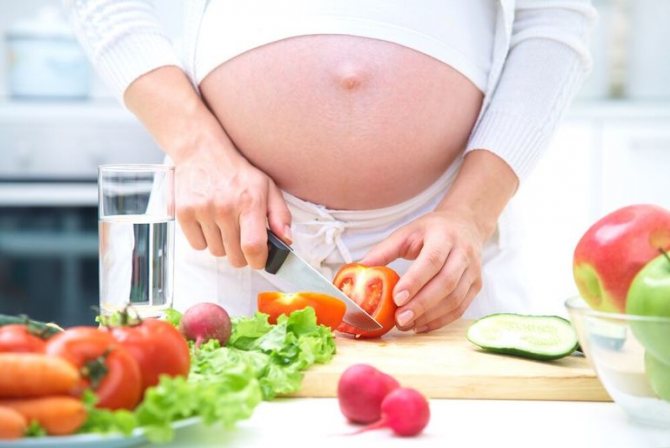
Nutrition at 25 weeks of pregnancy
Recommendations
The 25-week mark brings the onset of the third trimester closer. It is important not to miss warning signs, but behind the worries we must not forget to enjoy our condition. What should you do at this stage?
- Buy a bandage. It will help support a growing belly and reduce the load on the spine, which will now increase every day.
- Avoid synthetic underwear. The genitals “do not breathe” in it. This leads to the development of pathogenic microorganisms, which provoke inflammatory processes and various diseases.
- Review your diet. There should be more vegetables, fruits, and cottage cheese. You should completely give up salty foods: there is a high probability of edema.
- Enjoy life. If there are no contraindications, then you need to walk a lot, do special exercises, and don’t forget about your sex life. Everything that brings pleasure to the mother resonates with the baby.
A woman needs to be attentive to her body’s signals. Atypical discharge, a feeling of discomfort, and abdominal pain should alert a pregnant woman and force her to contact her gynecologist. Early detection of the problem will help get rid of it with minimal risks for mother and baby. The doctor's recommendations must be followed in full. Self-diagnosis, as well as self-medication, are prohibited in any trimester - the consequences can be irreversible.
Changes in the body, feelings of a woman
During this period, the uterus continues to grow. An important criterion is the height of the fundus of the uterus; it should rise above the pubis by 25-17 centimeters. If this criterion varies up or down, it is important to find the reason for such deviations. The doctor prescribes additional diagnostic measures. Often, when the size of the uterus is smaller than normal, we can talk about the presence of intrauterine growth retardation or placental insufficiency.
Most pregnant women experience active fetal movements, which reach five times a day. In some cases, when pushing the baby, a woman may feel pain or discomfort. This indicates the need to change body position, since the baby is uncomfortable.
The belly is already large and continues its active growth, the pressure on the diaphragm and organs of the digestive system increases. As a result of constant compression, gradual displacement of organs occurs. Symptoms such as constipation, shortness of breath, and heartburn appear. Such signs appear especially often in the second half of pregnancy.
It is important to remember that you cannot fight any unpleasant symptoms with the help of medications on your own. If they bother you, you should consult a doctor who will prescribe the most gentle medications to eliminate them.
Pain in the ribs and hip joints may occur. This is due to an increase in the size of the uterus and its compression of the bones. They seem to move apart, creating enough space for the fetus to come out freely.
Every day, the skin of the abdomen becomes more and more stretched, and stretch marks may occur. It is not easy to get rid of them after childbirth; it is better to take preventive measures to prevent their occurrence. Moreover, in every specialized store or pharmacy you can purchase a large number of cosmetics suitable for skin care during pregnancy.
There may be discomfort while walking. This symptom is especially pronounced if a woman is not carrying her first child. At this time, the gynecologist leading the pregnancy usually advises purchasing a prenatal bandage.
It is important that such a product lifts the growing belly, but does not squeeze it. Many expectant mothers note that at week 25 the baby hiccups more often. This is caused by ingestion of amniotic fluid, resulting in irritation of the diaphragm. It contracts, it feels like hiccups.
The mammary glands continue to increase in size, and at the same time, the secretion of colostrum increases during the day. Some expectant mothers experience increased pigmentation in the area of the nipples and breast areolas. A pigment stripe also appears in the center of the lower abdomen, and the skin turns brown.
Nasal breathing is difficult because blood circulation is increased, swelling of the mucous membranes of the nasal cavity appears. Additionally, the quality of vision may deteriorate at this stage.
Pain and heaviness often appear in the lower extremities, as the load on them systematically increases. Pain also appears in those women who previously suffered from varicose veins. To reduce stress on the legs and veins, wearing compression garments is recommended. A growing belly puts a strain on the back, which results in pain in the spine.
In some cases, the pain is sharp and radiates to the groin and sacrum. This is caused by constant pressure from the fetal head and pinched nerves in the lower back. In this case, the pain is located in the lumbar region, can radiate to the legs or buttocks, and tingling is felt in the legs.
To alleviate this condition, it is recommended to choose a hard mattress, not sit for long periods of time, and limit body bending.
Important. If the pain is severe, your doctor may prescribe therapy with medications and procedures.
During this period, mucous discharge may appear, which is the result of hormonal changes. They must be transparent. If they turn gray, yellow or brown, this is a signal to see a doctor. If additional itching and cheesy discharge appear, this may indicate the development of candidiasis. This phenomenon often accompanies the gestation period, since the immune system is weakened and is often exposed to pathogens and fungi.
Important. It is not recommended to treat the disease on your own; you should consult a doctor and begin proper therapy.
It is often during this period that varicose veins in the rectum - hemorrhoids - worsen. Its appearance is due to difficulties with the outflow of blood fluid, constant compression of the uterus and difficulties with bowel movements. It is worth visiting a doctor and undergoing the treatment prescribed by him.
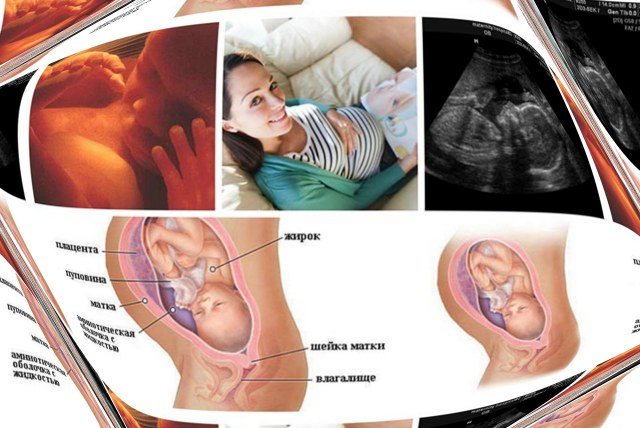
Associated pain sensations
During this period, various pain syndromes may occur. The lower abdomen begins to pull, and sometimes prolonged heartburn torments. Many people may experience lower back problems. It happens that a woman experiences contractions during this period.
There is no need to worry, these are training attempts. Many people don't even notice them. You should be wary if they are of an increasing nature, and the stomach begins to sharply turn to stone and harden. Frequent diarrhea and loose stools are possible. Your stomach may hurt.


